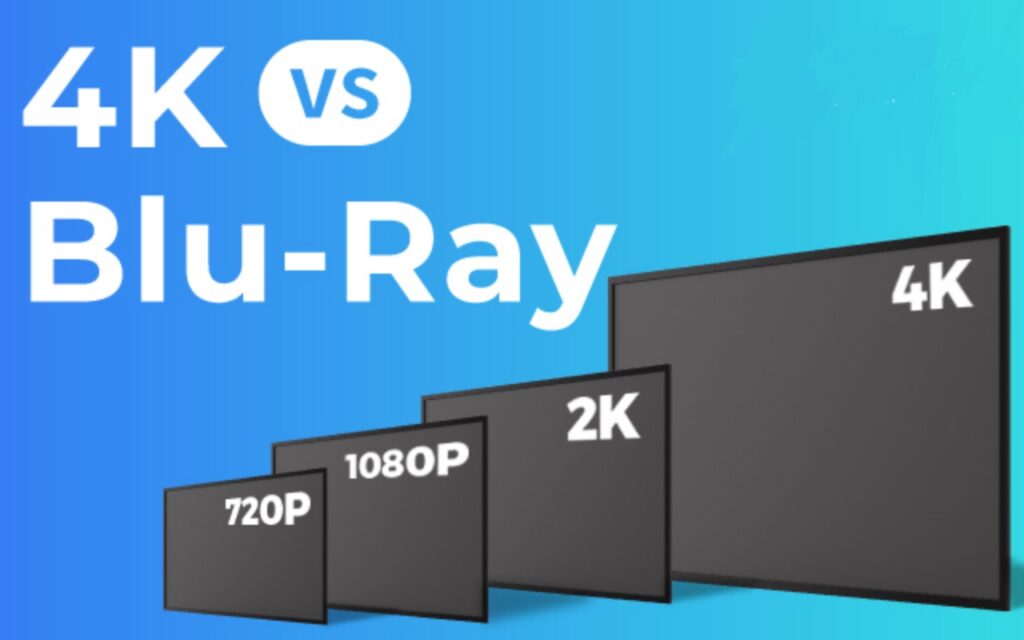In the era of ultra-high-definition content and home theater upgrades, one debate remains front and center: Blu-ray vs 4K. Whether you’re setting up a new entertainment system or upgrading your movie library, understanding the differences between these formats can help you make the best investment.
But between Blu-ray, 4K UHD discs, and 4K streaming, which is right for your home theater setup? This guide offers a side-by-side breakdown of the two technologies, their pros and cons, and when one might be better than the othercapabilities especially if you’re striving for the best in cinematic quality at home.
Overview of Blu-ray and 4K
Before diving in, let’s define what each format offers.
- Blu-ray: Introduced in 2006, Blu-ray discs offer 1080p Full HD resolution, high-quality lossless audio, and improved interactivity over DVDs.
- 4K UHD Blu-ray: This is an upgraded format that offers 4x the resolution of standard Blu-ray, supporting HDR (High Dynamic Range), enhanced color depth, and high-end surround sound formats like Dolby Atmos and DTS:X.
- 4K Streaming: Platforms like Netflix, Disney+, and Apple TV+ now offer 4K streaming options with HDR and spatial audio but these are highly dependent on your internet speed and device capabilities.
So, when comparing 4K vs Blu-ray, the first major factor is image resolution and how each platform delivers it.
Blu-ray vs 4K: Side-by-Side Comparison
1. Resolution & Picture Quality
What resolution is Blu-ray? Standard Blu-ray delivers 1920 x 1080 pixels, while 4K UHD Blu-ray offers 3840 x 2160 pixels—four times more detail.
- 4K UHD supports HDR10, Dolby Vision, and wider color gamuts, leading to more vibrant, true-to-life images.
- Blu-ray still looks excellent, especially on smaller screens, but lacks the dynamic color range and sharpness of 4K.
Is 4K better than Blu-ray? In terms of picture quality, yes—4K Blu-ray provides deeper contrast, enhanced clarity, and better color grading, especially noticeable on large home theater screens (55″ and up).
2. Audio Quality
Both Blu-ray and 4K UHD Blu-ray support high-fidelity surround sound formats like Dolby TrueHD and DTS-HD Master Audio. However, 4K Blu-ray often comes with Dolby Atmos or DTS:X, creating a 3D audio experience ideal for immersive setups.
Streaming platforms compress audio to save bandwidth, which can lead to a loss in quality. So for audiophiles, discs win every time.
3. Storage & File Size
- Blu-ray Disc: Holds up to 25 GB (single layer) or 50 GB (dual layer).
- 4K UHD Disc: Can store up to 100 GB (triple layer), necessary for high-resolution video and rich audio tracks.
This added storage means 4K Blu-ray can support higher bitrates, which directly translates to better video and audio quality.
4. Cost & Availability
- Blu-rays are generally more affordable and widely available.
- 4K Blu-rays are more expensive (usually $20–$30 per title), and not every title is released in 4K.
- Streaming often comes bundled in subscriptions (like Netflix or Disney+), making it more budget-friendly over time.
5. Hardware Requirements
To play these formats, here’s what you need:
- Blu-ray Player: Plays standard 1080p discs.
- 4K UHD Blu-ray Player: Required to play 4K discs. Many support HDR and advanced audio formats.
- Streaming Device: Apple TV 4K, Roku Ultra, or a smart TV that supports 4K HDR.
Also, a 4K HDR-capable display is essential to benefit fully from the improved resolution.
4K Blu-ray vs 4K Streaming Services
Streaming platforms like Netflix, Disney+, and Apple TV+ have invested heavily in 4K content. While they offer stunning visuals, there’s a catch.
4K Streaming: Pros
- Instant access, no physical media needed.
- Bundled with other content for low monthly costs.
- Available across devices (TV, tablet, phone).
4K Streaming: Cons
- Quality is often compressed to reduce bandwidth.
- Requires high-speed internet (25 Mbps minimum for reliable 4K).
- Prone to buffering or quality drops during peak times.
In contrast, 4K Blu-rays offer consistent, uncompressed playback and always deliver the best quality especially for those with high-end sound systems and 4K projectors.
However, since most 4K content is not available for offline viewing, you can only download streaming content in 1080p resolution. Tools like the CleverGet Netflix Downloader allow you to save Netflix titles in high resolution with Dolby audio support, so you don’t depend on internet quality to enjoy premium content.
When to Choose Blu-ray or 4K for Home Theater?
If you’re building a serious home theater system, here’s what to consider:
Choose Blu-ray if:
- You’re on a budget.
- Your TV is under 55 inches.
- You have a large collection of 1080p content.
- You’re not using high-end audio systems.
Choose 4K UHD if:
- You have a large 4K HDR TV or projector.
- You want the highest video and audio quality.
- You’re building a collection of premium films.
- You want a true home cinema experience.
Streaming may still serve as a convenient option for casual viewing or traveling, but discs remain the gold standard for enthusiasts.
Bonus: Create Your Own Blu-rays for Home Theater
Did you know you can create custom Blu-rays or 4K UHD discs from your personal videos or backed-up movies?
Software like the Leawo Blu-ray Creator and UHD Creator allow users to burn HD and 4K content to discs, complete with custom menus, subtitles, and chapters.
This is perfect if you:
- Want to archive your video library in physical format.
- Create personalized gifts (e.g., wedding, travel, or birthday videos).
- Make high-quality backups of home movies or rare media.
You can even convert streaming content or downloaded 4K videos into discs to play on your home theater system.
Conclusion
So, is 4K better than Blu-ray? When it comes to resolution, audio fidelity, and overall viewing experience—yes, especially in disc format. However, Blu-ray still holds strong for affordability and accessibility, especially if you don’t yet own 4K hardware.
In the 4K UHD vs Blu-ray debate, your decision ultimately comes down to your setup, your content preferences, and how much you value visual and audio quality.
If you’re a serious movie lover or audiophile, 4K Blu-ray is worth the investment. If you prefer convenience or are limited by budget, Blu-ray or 4K streaming can still deliver great entertainment—especially when enhanced by tools like CleverGet Netflix Downloader for offline viewing or Leawo Blu-ray Creator for building your own collection.



